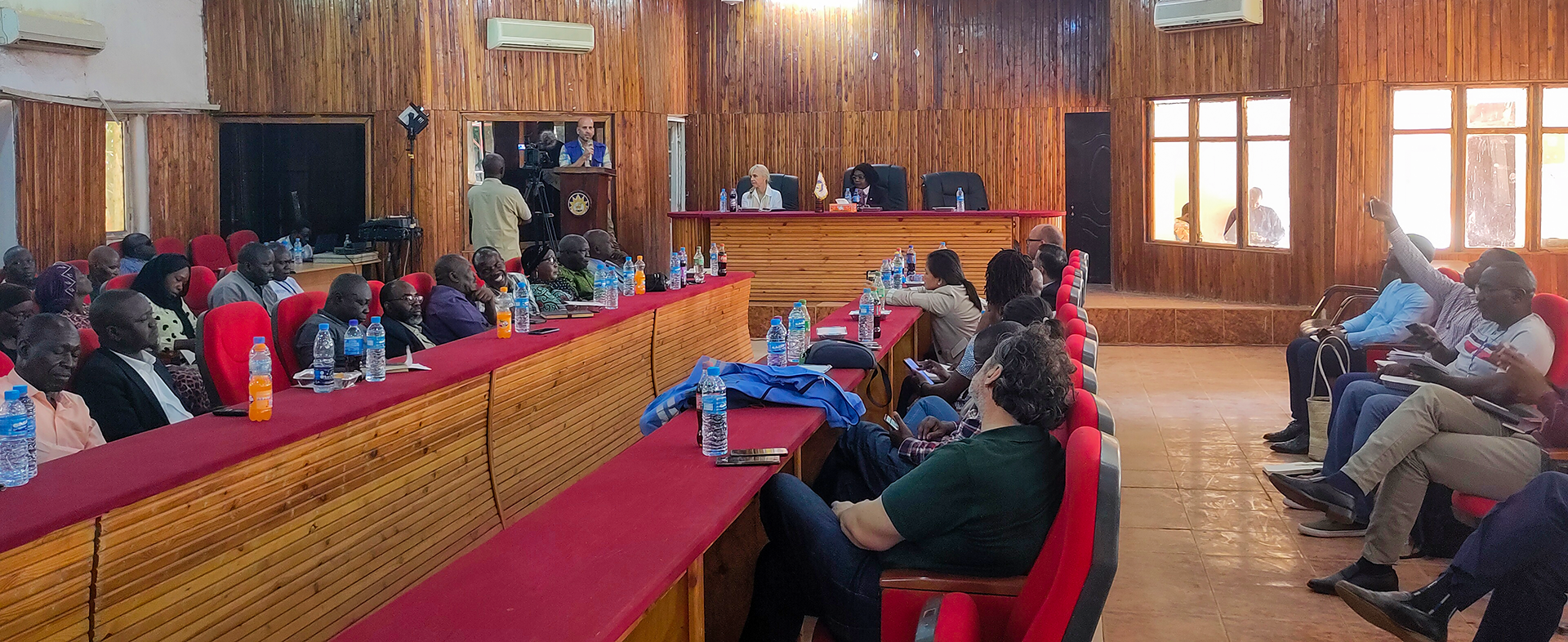-
Who We Are
WHO WE AREThe International Organization for Migration (IOM) is part of the United Nations System as the leading inter-governmental organization promoting since 1951 humane and orderly migration for the benefit of all, with 175 member states and a presence in over 100 countries. IOM has had a presence in South Sudan since 2011.
About
About
IOM Global
IOM Global
-
Our Work
Our WorkAs the leading inter-governmental organization promoting humane and orderly migration, IOM plays a key role to support the achievement of the 2030 Agenda through different areas of intervention that connect both humanitarian assistance and sustainable development. IOM South Sudan provides a comprehensive response to the humanitarian needs of migrants, internally displaced persons, returnees and host communities.
Cross-cutting (Global)
Cross-cutting (Global)
- Data and Resources
- Take Action
- 2030 Agenda
IOM, South Sudan government launch initiative on durable solutions
Wau, South Sudan – Building on South Sudan’s National Strategy and Action Plan for Durable Solutions, the International Organization for Migration (IOM) and the state government of Western Bahr el Ghazal launched the Western Bahr el Ghazal Roadmap to Displacement Solutions Project to increase access to sustainable opportunities for the Internally Displaced Persons (IDPs) in the state.
The two-year, USD 5 million Norway government-funded project is part of IOM’s initiatives, along with other humanitarian partners, to support government efforts in finding sustainable solutions for IDPs in Naivasha and Hai Masna.
The state government, who prepared and designed the roadmap, will coordinate the identification and facilitation of durable solutions for the IDPs. The initiative will also benefit host community members according to their needs. During the project, these individuals will be provided with support to make informed decisions on which solutions pathway they would like to pursue, including local integration, voluntary return, or voluntary relocation.
“The security situation in Western Bahr el Ghazal improved dramatically. As a result, we see many people returning – both refugees and IDPs. People are coming to Wau to find peace. And everyone has the right to return voluntarily. This project is therefore a government initiative to facilitate durable solutions, supported by IOM. We thank Norway for their generous donation. For years we have been talking about solutions – now the time for implementation has come,” said Hon Sarah Cleto Hassan Rial, Governor of Wester Bahr el Ghazal State.
IDPs who will opt for local integration will benefit from multi-sectoral assistance such as documentation for housing, land, and property (HLP) rights; water, sanitation, and hygiene (WASH) services; protection and health services; as well as livelihood assistance, while those deciding on voluntary return or relocation will benefit from referrals to other humanitarian and development partners for assistance.

“The number of people in the camp has decreased over the past years. The people who remained don’t have anywhere to go. Access to land is a major problem. People either have no land, or they cannot reach it or invest in it. Once these issues are addressed, there will be no more displacement,” a chairperson from the camp management committee shared.
The process of finding durable solutions to displacement can take years as residual humanitarian needs and human rights concerns may linger. The roadmap supports identifying sustainable solutions, as well as bringing together resources from humanitarian, development, and peace actors.
“South Sudan has over 2.2 million displaced people within the country. With this program, we want to do our part to find durable solutions for the people of Naivasha Camp and Hai Masna Collective Centre. Collectively the government, community, IOM, and associated development partners will put in place solution pathways identified by the people themselves. At the same time, we must not forget that there are many more IDPS across the country. We hope that the project will draw attention to the plight of IDPs nationwide and highlight the need for greater government engagement to prevent the causes and mitigate the consequence of displacement”, said Ambassador Linken Nymann Berryman, Ambassador of Norway to South Sudan during the launch event in Wau.
“This initiative sets an example for other states in South Sudan and neighbouring countries to replicate and transition their cooperation with stakeholders from humanitarian aid to a more sustainable, development-oriented partnership,” Marrow added.
According to IOM’s Displacement Tracking Matrix DTM), more than 9,000 individuals from both Naivasha IDP site and Hai Masna collective centre and another 150,000 people from the host town of Wau will benefit from this Norwegian government-funded project.
For more information on this topic, please contact: Nabie Loyce in IOM South Sudan, Tel:+211912379843 Email: nloyce@iom.int
